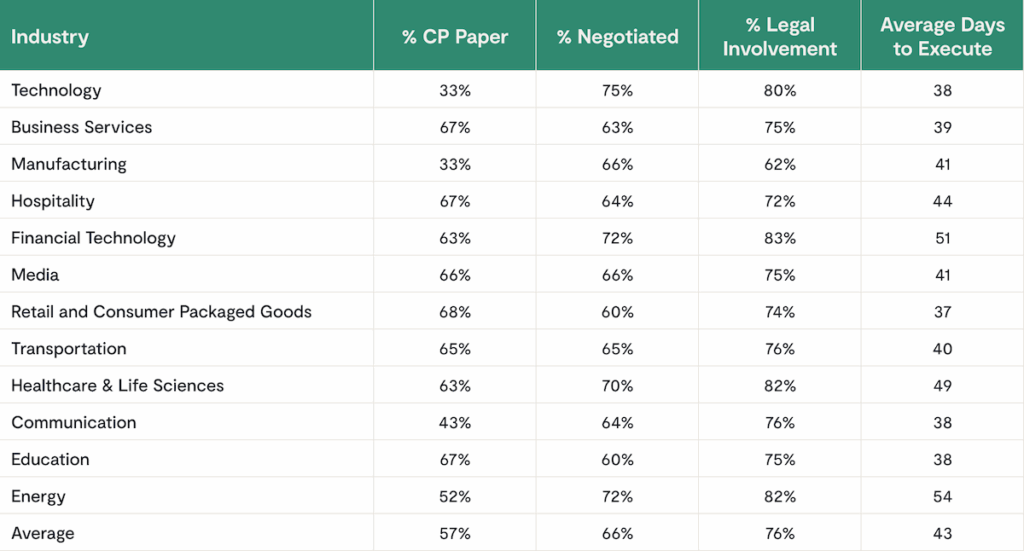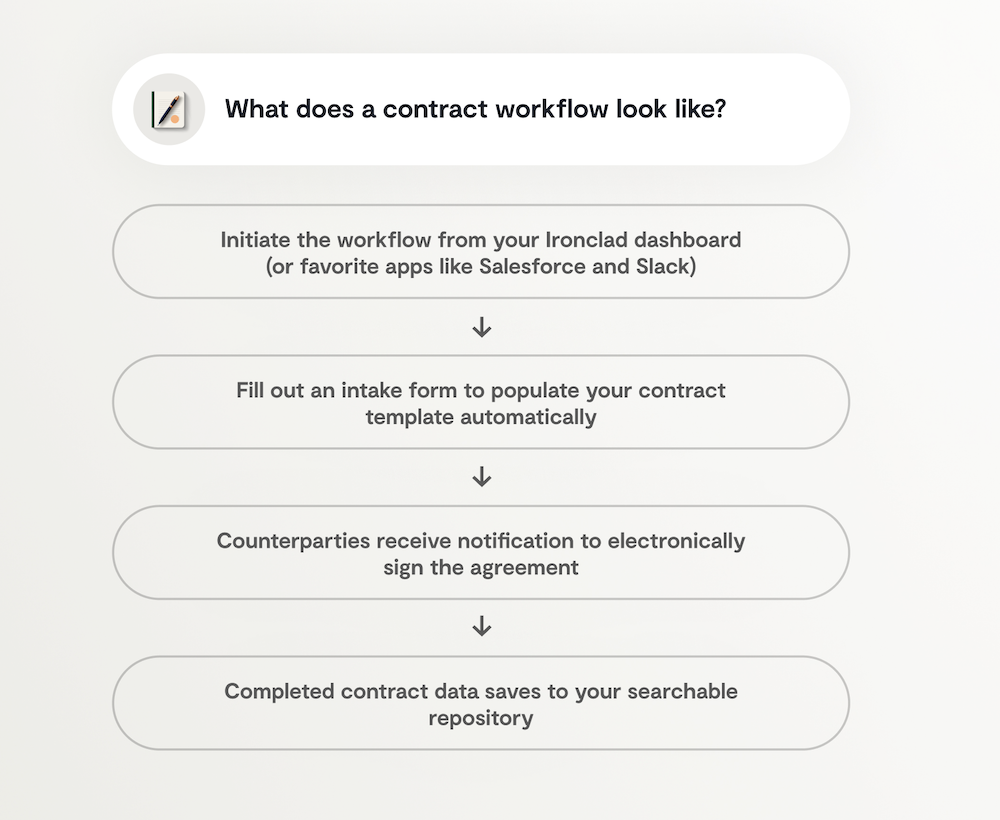Table of Contents
- What is matter management?
- Internal vs. external legal matter management
- Matter management challenges your team faces
- Benefits of legal matter management
- Key features of legal matter management software
- CLM: A powerful ally in legal matter management
- How to evaluate the best CLM for matter management
- Make matter management easier
Want more content like this? Sign up for our monthly newsletter.
Does it feel like your team is drowning in paperwork right now?
We’re talking about the kind of mindless cut-and-paste work that happens when you’ve got legal matter documentation spread out between different tools that don’t talk to one another. (Or worse, a never-ending spreadsheet just waiting for someone to accidentally overwrite.)
You hired your team because of their sharp legal acumen, yet they spend thousands of hours each year trying to find, edit, analyze, or store the paperwork your work naturally generates.
Enter: Matter management.
Manually managing the documents and workflows associated with legal matters isn’t efficient, but neither are the cobbled-together digital solutions many teams use. That’s why building a strong matter management process—with the right digital tools in your tech stack—can change your team’s entire workflow and get them out of tedious, low-level tasks and into impactful legal work they’re eager to handle.
What is matter management?
Matter management refers to the systematic process of organizing, tracking, and controlling all aspects of legal cases or projects within a law firm or legal department. It encompasses the coordination of resources related to specific legal matters from inception to resolution, such as:
Process: case and matter intake
How you capture relevant information about new legal cases and matters makes or breaks the rest of your matter management process. Ideally, you’ll collect information like the nature of the case, parties involved, critical deadlines, and any public evidence, data, or memos you already know about. Some companies use ticketing systems to capture case and matter intake, while others might use more disjointed methods like email and chat. Either way, matter management provides a system for you to organize the paperwork for a given legal matter from the beginning.

Documentation: document management
Cases create documents. Where do you store them? (Please don’t say a filing cabinet!) For matter management to work, you need one place to store all of your relevant documents about the case or project. Document management includes document indexing and metadata tagging, version control and reconciliation, and secure storage and retrieval of all legal documentation.

Project management: workflows
Where matter management gets complicated is mixing it with project management formats and tools from elsewhere in the organizations. The busywork comes from completing task assignment, prioritization, and progress tracking within multiple systems that aren’t clearly integrated with one another.
A proper matter management system will integrate with multiple platforms, from CRMs like Salesforce to sending notifications in Slack or Teams.

Financials: Billing and invoicing
Accurately tracking and managing the costs associated with legal matters is absolutely necessary for the firm. An effective billing and invoicing system should include time tracking, expense management, and invoicing to manage the financial aspects of legal matter management.
Teamwork: Communication
Legal teams are inundated with messages on multiple communications platforms every day: Email, Slack, Company-wide missives, internal documentation, and more come across your virtual desk. As you manage a case (or project), you want to create a “paper trail,” which means effectively communicating with the right stakeholders for each step in the process, whether that’s team members, vendors, or other outside parties.
Analytics: Data management
Beyond your day-to-day responsibilities actually handling legal matters, your team also needs to think about the process behind these workflows. What’s the average monthly contract volume? Deal size? Time to completion? These are all performance questions that can show how legal can drive revenue.

Compliance: Regulatory standards
Of course, you also need to make sure you’re handling these matters in accordance with legal and regulatory requirements. This includes preparing for audits, secure storage of documents that may include sensitive client or customer data, and legal filings to make sure you’re mitigating any potential risk exposure for your business.
Internal vs. external legal matter management
Matter management takes place whether you’re handling external affairs or managing internal operations within your team. While both internal and external uses of legal matter management share some common business goals like improving efficiency and communication, the focus and specific features of these systems may vary:
How corporate legal teams use matter management internally
Internal matter management can help:
- Streamline operations.The primary objective of using legal matter management systems internally is to simplify the day-to-day operations of the legal team, like managing cases, documents, and workflow.
- Improve efficiency. Implementing processes and legal systems can help legal teams work more efficiently by automating repetitive tasks (think time tracking and invoicing) and by providing real-time visibility into the progress of legal matters.
- Build better collaboration. By providing a centralized platform for communication and collaboration, legal matter management systems can help legal teams work together more effectively.
- Manage costs. Time tracking, billing, and invoicing can help internal teams prove their worth as a value-add instead of a necessary drain.
Corporate teams use matter management to evaluate their operations and work on the business, rather than simply executing their regular day-to-day tasks.
How teams use matter management for customers and clients
External matter management can help:
- Improve communication. Legal matter management systems can help corporate legal teams communicate more effectively with vendors and external stakeholders. Secure document sharing enables efficient communication between the legal team and counterparties.
- Build relationships. Giving stakeholders access to real-time information about their legal matters can help corporate counsel improve satisfaction with clients and customers by providing a better understanding of their legal issues’ progress and how the team plans to proceed.
- Increase transparency. A centralized platform for communication and collaboration increases transparency with vendors and other external stakeholders. Real-time performance metrics, custom reporting, and data visualization can provide stakeholders with a clear understanding of the progress of legal matters.
Corporate teams use matter management to better manage their client and customer relationships, making it easy for all parties to understand where they are in the legal process and how the team continues to move forward.
Matter management challenges your team faces
In James Clear’s book Atomic Habits, he writes,
“You do not rise to the level of your goals. You fall to the level of your systems.”
This is true whether you’re trying to run a marathon or re-wire your legal department’s systems. Change is hard. It’s a matter of pride in many legal circles about how hard and long lawyers work. Today, over half of legal professionals are unsatisfied with their work, according to our research.
But it doesn’t have to be that way. You didn’t take this job just to spend hours prepping the same NDA or clicking a button on a ticket.
To do matter management right, you’ll face a series of challenges, including:
- User adoption. Getting your team to use a new system can be challenging, particularly if they are used to working with traditional methods.
- Data integration. Your software needs to be able to work with your existing tech stack.
- Data accuracy. Ensuring that the data entered into a matter management system is accurate and up-to-date is vitally important, as errors can impact the handling of a case.
Implementing a matter management system for your team can be a complex and time-consuming undertaking, requiring significant resources and coordination—but it’s worth it. 75% of legal teams are actively developing or improving their approach to legal technology and data, hoping to find solutions for persistent legal ops challenges like disorganized data (52%), disconnected systems between legal and business platforms (44%), and limited access to accurate, real-time information (41%), according to a recent EY survey.
By streamlining matter management processes, these solutions ultimately lead to better outcomes and increased productivity.
Benefits of legal matter management
Why bother with matter management, if it’s so difficult?
Because matter management is so fundamental to how a legal team gets its work done that you don’t even notice how your processes impact your bottom line—you’re likely too busy handling case after case with tight deadlines and 24/7 expectations. Axiom found that 96% of legal departments reported budget cuts and hiring freezes between 2023 and 2024. Legal teams are asked to do more with less no matter where they work.
Creating a set process for your matter management allows your legal team to breathe a little easier. You already work with standardized processes in governmental affairs or through court documents—doing the same for your team can make a huge difference in productivity and efficiency. (And also save your teammates from the intense burnout that permeates the legal field.)
An effective matter management process allows you to:
- Stay organized with a centralized platform for organizing and tracking the various aspects of a case, including documents, deadlines, and communications, allows you to stay updated on the status of all legal matters.
- Share information, discuss cases, and keep stakeholders informed about the status of their cases and respond promptly to any questions or concerns.
- Gain insight into the performance of your cases and your department. You can use this information to make data-driven decisions that provide concrete results.
- Improve security; platforms offer secure storage for sensitive documents and data, protecting confidential information.
By streamlining matter management processes, these solutions ultimately lead to better outcomes and more productivity.
Key features of legal matter management software
You don’t have to keep all of this information in your head or scattered between different digital tools. Instead, legal matter management software can help keep your teams organized, centralize all important documentation, and help move cases forward more quickly.
Matter management software should cover all of your legal workflows, including:
- Documentation. Tracking of case files, notes, deadlines, and relevant documents in one centralized location
- Project management. Calendaring, stakeholder contact information, task assignment, deadline tracking, and reminders
- Billing and invoicing. Time tracking, invoice generation, and payment tracking for billable hours
- Communication. Secure messaging, client-facing portals, or other means of communication directly about the case
- Security and compliance. All of this needs to be done in a secure fashion, with end-to-end encryption and following industry standard protocols like SOC I, SOC II, and ISO27001
Like many corporate legal teams, ours increasingly handled more requests than simple contract review—and with it, more paperwork. “We needed a scalable solution for the legal team to engage with the business efficiently. By moving lawyers away from fielding requests via email, Slack, or even getting tapped on the shoulder in the office and into a centralized intake process, we can track the volume and type of requests,” said Crystal Wu, our former legal operations manager. “This arms us with structured data on our team’s resource allocation, and even surfaces issues and risks that our business is facing.”
Our legal team now funnels all requests through a single channel, which reduces ad-hoc legal inquiries and a mountain of legal intake paperwork. Now, we can focus more on deep work and less on managing incoming requests—and our product offers a scalable solution that adapts to increasing demand from the rest of the organization without compromising quality or efficiency.
By funneling all requests through a single channel and collecting comprehensive information upfront, we’ve greatly reduced ad-hoc inquiries and the need for follow-up questions. This allows our legal team to focus more on deep work and less on managing incoming requests. As our company continues to grow, this workflow provides a scalable solution that can adapt to increasing demand without compromising quality or efficiency.
CLM: A powerful ally in legal matter management
One of the areas of matter management that causes the most friction and repetition within your legal workflow is your contracts. Document management takes up so much time and energy within matter management that it’s worth tackling first. If you aren’t sure where your in-flight contracts are, or can’t pull a report of your executed contracts at a moment’s notice, then you’re ready for a CLM.
Contract lifecycle management (CLM) tools automate and streamline the entire contract lifecycle, from creation to renewal and termination. While not a complete solution for all aspects of legal matter management, CLM offers value by centralizing your documentation in one place, making it easier to manage everything from vendor agreements to complex multi-party deals.

CLM tools can also automatically flag upcoming contract renewals, expiration dates, and other critical milestones, helping legal professionals stay ahead of their obligations. By providing a centralized repository for all contract documents, CLM systems eliminate the need for physical file storage and reduce the risk of document loss or version control issues.
This centralized approach also facilitates better collaboration among team members, as everyone can access the most up-to-date versions of documents. From there, it can automate various stages of the contract lifecycle, from initial drafting to final approval. By streamlining these processes, legal teams can work more efficiently and reduce the likelihood of bottlenecks or errors.
While not a one-size-fits-all solution for matter management, CLM systems provide robust support for contract-related legal work. “At its core, a business is just the sum of its contracts. Having an organized repository with direct access to that data is essential for functions like finance to get a complete picture of what’s going on. If that’s scattered across laptops and emails, you can never be fully prepared when you need to act nimbly,” said Dave Wieseneck, Expert in Residence (XIR) at Ramp.
As legal departments and law firms continue to seek ways to improve efficiency and accuracy, CLM stands out as a powerful ally in managing an essential aspect of legal operations.
At its core, a business is just the sum of its contracts.”
Dave Wieseneck | expert in residence, ramp
How to evaluate the best CLM for matter management
Effective legal matter management is critical for corporate teams to efficiently handle and track legal cases, agreements, and other legal processes. By choosing a well-suited CLM tool and following best practices, you can streamline legal operations, improve transparency and communication, and reduce the risk of errors or missed deadlines. Ask yourself and your procurement team:
Is this tool easy to use?
Look for solutions with a straightforward setup process and user-friendly interface that’s easy for a nontechnical team to manipulate. Ease of use minimizes the time and resources required to get the tool up and running. “If the software requires training, it’s dead,” said Mary O’Carroll, COO at Goodwin. “People need to be able to see it for the first time, and their reaction should immediately be, ‘Oh, I get it. It works how I expect it to.’”
Will it easily integrate with my other tools?
Ask about data integration with other systems and your department’s current software, including document management systems and customer relationship management systems (CRM). Check that any new tool comes with the right integrations, whether that’s making sure you can track progress in Asana, add contracting to your Salesforce pipeline, or automatically alert your colleagues on Slack when a contract is ready for them to view.
Does it have safeguards for accuracy?
Features such as automated data entry and validation can improve contract management data accuracy. Automating these checks reduces the risk of errors and ensures that the data entered into the system is accurate and current.
Will it keep our internal and client data secure?
Security should be a top priority in your search for a matter management tool, so ask about features such as encryption, role-based access controls, and audit trails. Look for data encryption (TLS 1.2 or higher) and implementation of industry standard protocols like SOC 1, SOC 2, and ISO 27001.
What’s the total cost of ownership (TCO)?
CLM tools can be cost-effective since they usually have lower implementation and maintenance costs than traditional matter management systems. According to WCC, organizations lose an average of 8.6% of total spending a year to cost leakage in contracts. If you could prevent just 2% of the average 8.6% cost leakage, you’d save over $500K a year through your CLM investment.
Make matter management easier
With effective contract management comes effective matter management, ensuring that all relevant documents are easily accessible and well-organized, saving precious time and reducing the risk of oversight. “We can reduce risk, provide a better quality of work for our internal clients, and a better experience,” said Maximilian Henkensiefken, Head of Legal Technologies and Processes at Amadeus. A robust legal matter management system can help you make more informed decisions, minimize legal risks, and improve your department’s overall performance. If you’re ready, talk to an expert about how to focus on high-value work—instead of spending your time trying to find an Exhibit A from 2016.
Ironclad is not a law firm, and this post does not constitute or contain legal advice. To evaluate the accuracy, sufficiency, or reliability of the ideas and guidance reflected here, or the applicability of these materials to your business, you should consult with a licensed attorney. Use of and access to any of the resources contained within Ironclad’s site do not create an attorney-client relationship between the user and Ironclad.














